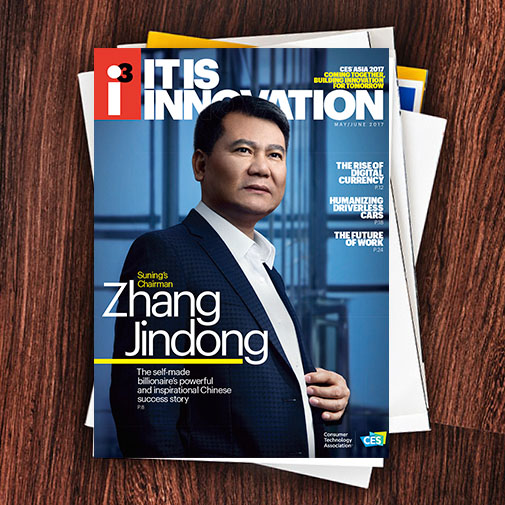There’s a lot to find in ZJ Park, but you won’t see factories, Wang adds. The area only houses R&D centers, including 67 incubators providing workspaces for budding startups. The park holds a diverse amount of disruptive technology, including robotics, software and biomedicine. Some of the biggest tech companies, including HP, NVIDIA and Qualcomm host offices in ZJ.
One ZJ-based startup, Pimax, won the Best Virtual Reality Product of CES Asia 2016 for a 4K headset designed for gaming and 360° movies. The company continues to innovate and recently announced its fi rst 8K VR headset.
Fourier X1 is also working out of ZJ Park building a lower-body exoskeleton designed to help people with disabilities walk again. The wearable robot is in early development, but will aid those who have spinal cord injuries or had strokes.
To support these businesses, some 200 venture capital funds are located at the park, according to Alacrity Foundation. Last year, China became the first country to receive more than one million patent applications in a year, according to the Financial Times.
“The Park is witnessing the gradual formation of the culture of ‘independent design, independent business operation, free competition,’ and the entrepreneurial atmosphere of ‘encouraging success and tolerating failure,’” according to the ZJ Park government website.
The government is lending a hand, as well. For 2020, the state approved building a global technology and innovation center to support foreign investments and research.
Some 110,000 of ZJ Park’s 360,000 workers have a bachelor degree or higher, Wang says. Many of them got their degree within the park at ShanghaiTech University. The University is also working with Zhangjiang Incubator Management and startup accelerator Xnode to build a student-focused InnoLab. “As a platform to serve startups, we also make great efforts to bridge the gap between universities and startup companies,” Wang says. “We have a variety of events and activities to let students and startup founders meet and talk.”
ZJ Park isn’t the only Innovation Park in China. Here are three other thriving innovation hubs:
Changzhou
Located northwest of Shanghai, this city features an innovation park with a dual initiative by both China and Israel to help Israeli companies break into the local market.
TusPark
Connecting professionals, Tus Park is a global network of different hi-tech business parks located in Chinese cities like Beijing to places like India and France. Each area offers public companies and enterprises workhubs, makerspaces and everything else a startup needs.
Chengdu
The capital of China’s Sichuan province is home to some of the most successful development zones in China focusing on electronics and software development.

i3, the flagship magazine from the Consumer Technology Association (CTA)®, focuses on innovation in technology, policy and business as well as the entrepreneurs, industry leaders and startups that grow the consumer technology industry. Subscriptions to i3 are available free to qualified participants in the consumer electronics industry.